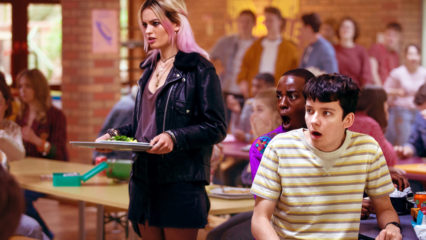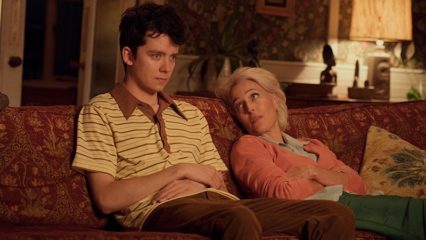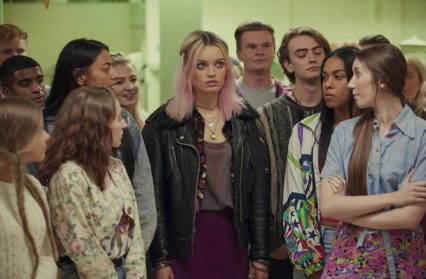Siobhan Denton looks at Netflix’s latest streaming phenomenon, Sex Education, a comedy coming-of-age series filmed in Wales.
Sex Education is a rare achievement. The series, marking writer Laurie Nunn’s television debut, is simultaneously engaging, informed and surprisingly tender without ever belittling, or undermining its audience. The narrative intelligently balances moments of real, and rare insight, with well-judged pathos. Set in a purportedly British sixth form – although its rendition of high school hierarchy and culture is far more recognisable as a trope of US TV – the narrative focuses upon the sixth formers attempting to navigate and discover their sexual identity. Given the woeful lack of quality and useful sex education in schools, it is notable and believable that these students, despite their apparent worldliness and ready access to pornography and crude discussion amongst friends, are often entirely at unease with their own bodies and desires.
 The central conceit itself, while rather high-concept, feels rooted in reality. Otis (Asa Butterfield) is, through his mother’s career as a sex and relationships therapist, entirely au fait with various theorists and models of therapy and, as such, when confronted with a fellow student’s current sexual difficulty, is quick to offer well-intended, and helpful advice. Recognising his ability to coach and support his fellow students, intelligent, yet much-maligned female lead Maeve (Emma Mackey), who readily references existentialism and critical theory as part of her regular discourse, proposes that they monetise Otis’ insight and start a therapy service for the student body. In lesser hands, the concept could, and would, have led to various escapades increasing in explicit and supposedly comical nature, and certainly, some of the scenarios are comic, but only incidentally. In reality, these students accurately depict the fear and anxiety that surrounds sex and burgeoning sexuality.
The central conceit itself, while rather high-concept, feels rooted in reality. Otis (Asa Butterfield) is, through his mother’s career as a sex and relationships therapist, entirely au fait with various theorists and models of therapy and, as such, when confronted with a fellow student’s current sexual difficulty, is quick to offer well-intended, and helpful advice. Recognising his ability to coach and support his fellow students, intelligent, yet much-maligned female lead Maeve (Emma Mackey), who readily references existentialism and critical theory as part of her regular discourse, proposes that they monetise Otis’ insight and start a therapy service for the student body. In lesser hands, the concept could, and would, have led to various escapades increasing in explicit and supposedly comical nature, and certainly, some of the scenarios are comic, but only incidentally. In reality, these students accurately depict the fear and anxiety that surrounds sex and burgeoning sexuality.
Equally important is the nature of the characters themselves. The series features a diverse cast, one that varies in ethnicity, appearance and sexual orientation, yet never feels tokenistic. Characters from BAME backgrounds are simultaneously not defined by their ethnicity, yet neither is it ignored. Eric (Ncuti Gatwa), Otis’ best friend, is openly gay, and the conventional binary opposite would have been to present his sexuality as being in direct conflict with his church-going African family. Instead, refreshingly, Otis’ father’s fears over his son going out in society dressed in drag is one of fear. His fear stems not from homophobia, but rather a concern that his son’s appearance will lead to him being targeted by bigots. Jackson, the popular head boy and athlete is similarly not defined by his ethnicity, and it is his class that is a bigger defining feature. His family, clearly wealthy and invested in his sporting prowess, are entirely at odds with Maeve, who initially struggles with her perception of Jackson’s family as being idealistic.
 The representation of gender too is nuanced and progressive. Otis is entirely aware of concerns over objectification, and in dealing with his attraction to a female character, reminds himself of the importance of ensuring that he is not approaching his desire in a way that is demeaning. His advice to a female client, in which she discloses that her current relationship difficulty stems from her partner’s desire to please her sexually and her lack of familiarity with her own body and therefore her own pleasure, is pleasingly positive. Otis recommends that she determines what she desires, and should, therefore, find out for herself. Maeve’s pejorative reputation amongst the student body of being provocative and sexually adventurous is one that stems from gossip. Her later recount of a scenario which triggered her reputation will be instantly familiar to those that have similarly suffered under misogynistic standards and wants.
The representation of gender too is nuanced and progressive. Otis is entirely aware of concerns over objectification, and in dealing with his attraction to a female character, reminds himself of the importance of ensuring that he is not approaching his desire in a way that is demeaning. His advice to a female client, in which she discloses that her current relationship difficulty stems from her partner’s desire to please her sexually and her lack of familiarity with her own body and therefore her own pleasure, is pleasingly positive. Otis recommends that she determines what she desires, and should, therefore, find out for herself. Maeve’s pejorative reputation amongst the student body of being provocative and sexually adventurous is one that stems from gossip. Her later recount of a scenario which triggered her reputation will be instantly familiar to those that have similarly suffered under misogynistic standards and wants.
Importantly, the series assumes its audience is intelligent. When a bully emits a homophobic remark, the comment is instantly questioned and shut down as ‘being so 2008 totes passé’ rather than immediately prompting a narrative thread. The issues and concerns that Sex Education are far more nuanced, fuelled through well-crafted, fully dimensional characters that, crucially, are relatable and realistic. With a second series already being discussed, it is clear that the series has engaged with its audience: a quick search online for the series results in a plethora of articles that deservedly highlight the plaudits that the series has been awarded. Sex Education is a series that feels pertinent and necessary, one that can and should be recognised for its witty, thoughtful writing and fully-formed characters.
Read Gareth Leaman’s companion article focusing on location in Netflix’s Sex Education here.
Siobhan Denton is a teacher and writer.












